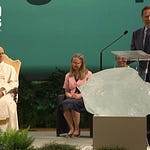Shipping is one of those things that’s just supposed to work. Post-Titanic, people decided they didn’t want maritime transport to be particularly sexy or interesting (also known as ‘dramatic’). So we created a set of rules that currently are taken care of by the International Maritime Organisation (IMO), which successfully removed a lot of drama from shipping - so successful that Britain’s ‘shipping forecast’ that was once life-or-death information for critical workers in a strategic industry is now the soothing stuff of ASMR go-to-sleep appointment listening.
That late-night BBC ritual of calm voices and cryptic geography — “Viking, North Utsire, South Utsire…” — has lulled generations to sleep. It’s also a kind of secular prayer: proof that somewhere, someone is still keeping watch through the storm.
So it’s a bit disconcerting when President Donny Six-Fingers bursts into studio to disrupt the forecast. But that’s more or less the equivalent of what happened last month at the IMO.
According to a Financial Times investigation, U.S. officials under the Trump administration didn’t just lobby against a global carbon levy on shipping — they threatened, intimidated, and blackmailed diplomats in the organisation’s normally tasteful and cozy London corridors. Delegates from Africa, the Pacific, and the Caribbean were reportedly warned their ships might face higher U.S. port fees, their officials denied visas, their trade punished, even their families restricted from travel, if they didn’t abandon support for the Net Zero Framework that the UN-affiliated IMO endorsed only 6 months earlier.
“It was like dealing with the Mob,” one diplomat told the FT. Another said simply: “They went from delegation to delegation, threatening them.”
In the end, it worked.
The deal — which would have created the world’s first carbon-pricing mechanism for global shipping — was postponed for a year. The IMO, normally the most technocratic of international bodies, was left “in a state of complete shock.”
For the uninitiated, this may sound arcane. But shipping matters — a lot. Roughly 90% of global trade moves by sea. The sector accounts for about 3% of global CO₂ emissions — more than Germany — and it’s been largely outside the reach of climate regulation - excluded, for example, from the 2015 Paris Agreement.
The Net Zero Framework was meant to change that: a multilateral attempt to finally bring the shipping industry into the decarbonisation mainstream. It had already been provisionally agreed by a majority of countries in April. But by October, something had changed.
Countries that once supported the deal — including China, India, Panama, Liberia, and even Greece and Cyprus, who broke with the EU line — suddenly voted to adjourn.
The shift didn’t come from nowhere. It came from pressure. From a U.S. administration that now defines climate policy not as a global necessity, but as an existential threat to American interests.
On this extended episode of Wicked Problems, we spoke with three people trying to make sense of the wreckage.
Ariane Morrissey of Ship.Energy was there in the building as the talks imploded. She describes the mood as surreal, with delegates who came to discuss fuel standards suddenly fielding threats of sanctions and visa bans.
Professor Tristan Smith of UCL, who’s been involved in these negotiations for over a decade, gives the longer view: that this is not just a failure of climate diplomacy, but a warning shot about the fragility of the multilateral system itself.
And Carly Hicks of Opportunity Green explains how the IMO had been one of the last truly global forums where climate ambition could meet technical reality — until political interference capsized the process.
Smith points out that while the U.S. may have succeeded in buying time, it may also have accelerated something else: the rise of regional regulation. The EU’s carbon trading scheme now covers shipping. Others — from Singapore to Japan — are exploring their own carbon levies. The patchwork world is arriving, faster than the ships can adjust.
Multilateralism was supposed to make it simpler. Now it’s every bloc for itself.
Department of Not-Terrible-News
Quite frankly it’s been a torrid few weeks. There were, and remain, many reasons to be pessimistic going into the COP30 climate talks in Brazil.
Fortunately Zohran Mamdani has been elected mayor of New York City, so everything is fixed.
OK fine it’s not but give yourself a minute to be happy.
Exit Music
We couldn’t resist including the best radio ever conceived.
You’ll find all our exit music here:
Back soon.














